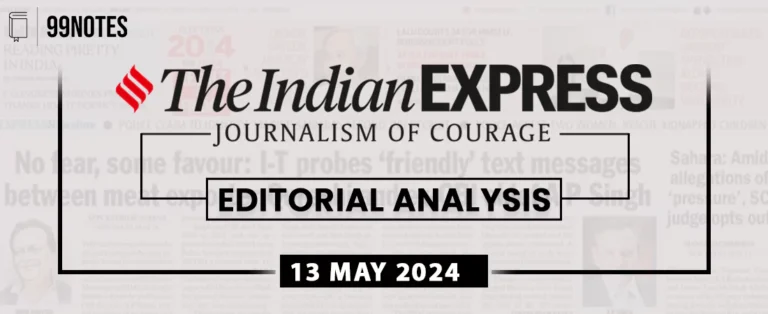5 Jan 2024 : Indian Express
Indian Express
5- January-2024
1. Reshaped by AI
| Topic: GS2 – Governance, GS3– Science and Technology- Effects of S&T in everyday life. This topic is not much relevant in the context of Prelims but more for Mains in the context of global initiatives, ethical considerations, international cooperation, governance challenges, and the impact of artificial intelligence on democracy and security. |
| Context: |
|
UN’s Ethical Framework for AI:
- In 2019, the UN started working on “frontier technologies” and AI, creating a roadmap and strategic framework for building AI capabilities.
- Key guidelines for the moral application of AI inside the UN system were established in a 2019 UNESCO proclamation, which placed an emphasis on concepts including respect for human rights, ecological sustainability, diversity, inclusivity, good governance, and just development.
- The groundwork for incorporating these ideas into the UN’s AI policy is laid by the recommendation of a system-wide normative and operational framework for the moral application of AI.
Challenges to Ethical AI Implementation:
- Despite these initiatives, the growing notion of “digital sovereignty” cannot be ignored in discussions about the moral application of AI.
- Digital sovereignty, which is essential to the cross-border, multilayer regulation of artificial intelligence, is progressively replacing the idea of territorial sovereignty.
- Concerns over how to stop these problems in governance and development to guarantee truth and responsibility are raised by the difficulties, which include the spread of hate speech, false information, and disinformation.
Threats to Privacy and Democracy:
- The dangers that artificial intelligence (AI) tools offer to decision-making and information privacy have been brought to light by experts.
- These tools have the ability to influence the foundations and mechanisms of democracy.
- They stress that the main purpose of AI at the moment is to gather personal data and build intricate behavioural profiles, which could compromise autonomy, privacy, and anonymity.
- To stop the erosion of democracy and privacy, immediate action at the national, regional, and international levels is required.
Digital Empires and Regulatory Models:
- The US and China are still at odds over digital issues, which highlights the rise of three separate “digital empires.”
- According to expert analysis, the US adopts a free digital model that emphasises the autonomy of the AI sector and lets the free market choose how content is produced.
- Conversely, democratic countries are becoming concerned about China’s state-driven regulatory paradigm, which is characterised by control over private AI companies and surveillance.
- A few democracies already in existence start to favour the EU as a preferred model because it is perceived as offering a more human-centric digital economy.
Uncertain Future of Technopolitics:
- Technopolitics faces an uncertain future as rival models like digital authoritarianism, surveillance capitalism, and liberal democratic values compete for supremacy.
- The human rights-based approach is given priority in the EU’s Declaration on Development, which further complicates the already difficult situation.
- Which foundation—surveillance capitalism, digital authoritarianism, or liberal democratic values will influence social interaction and human interaction in the rapidly developing digital era is still up for debate.
- AI in Warfare and Humanitarian Concerns:
- AI in combat takes a sinister turn as deadly autonomous weaponry systems transform the battlefield.
- The US Defence Department’s acronym for lethal autonomous weapons, or LAWs, represents the total reliance of unmanned systems on machine learning.
- This has led to worries regarding the dehumanisation of warfare and potential setbacks for international humanitarian law.
- As per experts it is important to “humanise” AI applications in both civil and military situations in order to avoid irreparable repercussions.
Conclusion:
- The intricate relationships between the dynamics of world politics, ethical issues in the development of AI, and the changing terrain of digital sovereignty highlight the opportunities and challenges that lie ahead for establishing a future that strikes a balance between ethical requirements and technological achievements.
| What is Artificial Intelligence? |
About:
|
| PYQ: Introduce the concept of Artificial Intelligence (AI). How does AI help clinical diagnosis? Do you perceive any threat to privacy of the individual in the use of Al in healthcare? (150 words/10m) (UPSC CSE (M) GS-3 2023) |
| Practice Question: Discuss the evolving landscape of global governance in the context of artificial intelligence, focusing on the recent UN initiatives and ethical frameworks. Analyze the challenges posed by the concept of “digital sovereignty” and its implications for international relations. (250 words/15 m) |
2. THE RIGHT SUPPORT
| Topic: GS3 – Agriculture- Issues related to Direct & indirect farm subsidies This topic is not much relevant in the context of Prelims but more for Mains in the context of issues related to MSP, import policies, and the challenges faced by farmers cultivating oilseeds and pulses, which are essential components of the agricultural landscape. |
| Context: |
|
Minimum Support Prices (MSP) Disparities:
- The inadequate MSP for oilseeds and pulses constitutes the first layer of policy discrimination.
- Farmers that grow rice, wheat, and sugarcane benefit financially from the MSP, but those who grow mustard and chickpeas find that their produce sells for less than the MSP.
- The article highlights the financial difficulties that farmers face as a result, as current market prices in Rajasthan and Maharashtra fall short of the MSP.
- The impending crop marketing puts additional financial hardship on many farmers.
Import Policies and Imbalances:
- Import policies are the foundation of the second aspect of discrimination.
- The impact of import duties on agricultural competitiveness is noteworthy.
- Specifically, wheat, milled rice, and sugar are subject to large duties, whereas most pulses, crude palm, soybean, and sunflower oil are imported duty-free.
- Concerns over the independence of India’s local production are raised by the article, which highlights the consequent increase in imports of edible oil.
- The intricacies of import regulations are examined in this section, along with their effects on farmers and the agricultural industry at large.
Edible Oil Imports and Self-Sufficiency Challenges:
- When the imports of edible oil are closely examined, they show a consistent rise from 11.6 million to 16.5 million tonnes, or $16.7 billion, between 2013–14 and 2022–2023.
- This increase suggests that self-sufficiency may face difficulties, a worry that becomes more pressing as the Modi administration adopts a more pro-consumer rather than pro-producer position.
- The ramifications of this change are discussed in the analysis, especially in light of the impending national elections.
- Research and Development Neglect:
- In research and development, oilseeds and pulses which are essential to Indian agriculture are given less attention than crops like wheat, rice, and sugarcane.
- This official disinterest is further demonstrated by the rejection of approval for genetically modified technologies.
- The ramifications of this kind of neglect are examined in the article, with a focus on the pulse industry, where modest advances have hampered the total growth potential of these crops.
Advocating Policy Correction:
- Concerns about current MSP and procurement practices that primarily benefit a small number of crops are being voiced by several government agencies.
- The article proposes a change to more market-oriented strategies, like per-acre income transfers, and calls for the rectification of market inefficiencies brought about by MSP-based policies.
- In order to foster a more equitable framework that supports farmers and resolves the discrepancies encountered by those who cultivate oilseeds and pulses, the final part makes a major policy adjustment proposal.
Conclusion:
- The hardships faced by Indian farmers who grow pulses and oilseeds highlight how urgently policy changes are needed.
- There are many obstacles to overcome, including differences in import and minimum support prices as well as a lack of investment in research and development.
- It is critical to take prompt remedial action, including moving towards market-oriented strategies, to protect farmer welfare and the long-term viability of India’s agriculture industry.
| What is the Minimum Support Price? |
|
| PYQ: What do you mean by Minimum Support Price (MSP)? How will MSP rescue the farmers from the low-income trap? (150 words/10m) (UPSC CSE (M) GS-3 2018) |
| Practice Question: Examine the role of Minimum Support Prices (MSP) and import policies in shaping the economic challenges faced by farmers cultivating oilseeds and pulses in India. (150 words/10 m) |
For Enquiry

13 Feb 2024 : Daily Current Affairs Quiz

13 Feb 2024 : Daily Answer Writing

13 Feb 2024 : Daily Current Affairs

13 February 2024 : The Hindu Editorial Notes PD

13 Feb 2024 : Indian Express Editorial Analysis

13 February 2024 : PIB Summary for UPSC

12 Feb 2024 : Daily Current Affairs Quiz

12 Feb 2024 : Daily Answer Writing

12 Feb 2024 : Daily Current Affairs

12 Feb 2024 : Indian Express Editorial Analysis
Daily Quiz 13 Feb 2024 : Daily Current Affairs Quiz 13 Feb 2024 : Daily Quiz…
mains answer writing 13 Feb 2024 : Daily Answer Writing Mains Answer Writing
13-February-2024
Q1) With the help of a map, show major ocean currents of the world….
Daily Current Affairs 13 Feb 2024 : Daily Current Affairs Daily Current Affairs
13-February-2024- Top News of the Day
1. Indian Navy Personnel Released from Custody…
Feb 2024 The Hindu 13 February 2024 : The Hindu Editorial Notes PD The Hindu Editorial
13-February-2024
1. A global alliance to bridge the gender equity gap
Topic:…
Indian Express 13 Feb 2024 : Indian Express Editorial Analysis Indian Express Editorial Analysis
13-February-2024
1. A science for us
Topic: GS2 – Governance…
feb 2024 PIB 13 February 2024 : PIB Summary for UPSC PIB Summary for UPSC
13-February -2024
1. Union Minister G Kishan Reddy inaugurate regional centre…
Daily Quiz 12 Feb 2024 : Daily Current Affairs Quiz 12 Feb 2024 : Daily Quiz…
mains answer writing 12 Feb 2024 : Daily Answer Writing Mains Answer Writing
12-February-2024
Q1) “Water scarcity threatens economic and social gains…
Daily Current Affairs 12 Feb 2024 : Daily Current Affairs Daily Current Affairs
12-February-2024- Top News of the Day
1. Great Indian Bustards give Nandyal a…
Indian Express 12 Feb 2024 : Indian Express Editorial Analysis Indian Express Editorial Analysis
12-February-2024
1. CLASSROOM VS COACHING
Topic: GS2 – Social…



